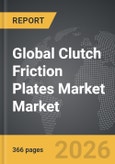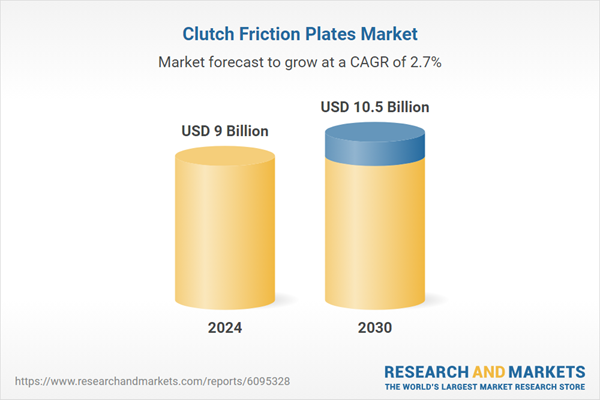Global Clutch Friction Plates Market - Key Trends & Drivers Summarized
The global clutch friction plates market is experiencing a steady upsurge, driven by increasing demand for automotive efficiency, industrial machinery upgrades, and the resurgence of manual transmission systems in specific vehicle segments. Clutch friction plates are a critical component of the clutch system, enabling torque transmission between the engine and gearbox by managing frictional engagement. Their performance directly impacts fuel efficiency, transmission responsiveness, and overall drivability. As internal combustion engines remain dominant - particularly in heavy-duty vehicles, off-road equipment, and motorcycles - demand for durable, heat-resistant, and precision-engineered clutch friction plates continues to rise.Market dynamics are increasingly shaped by technological advancements in materials science and thermal engineering. Innovations in friction materials - ranging from sintered metals and aramid fibers to carbon composites - are extending product life, improving resistance to wear, and enhancing thermal stability under high-load conditions. In parallel, automakers and transmission system manufacturers are collaborating with component suppliers to customize friction plates based on specific torque demands, load-bearing capacity, and vehicle application, resulting in a more diversified product ecosystem.
How Are Automotive and Industrial Trends Influencing Friction Plate Design?
The automotive sector is a dominant end-use market for clutch friction plates, with applications spanning passenger vehicles, commercial trucks, and high-performance motorcycles. In passenger cars, particularly in emerging markets, manual transmissions remain widely preferred due to affordability and mechanical simplicity. Friction plate manufacturers are focusing on lightweight construction and optimized surface treatment to reduce rotational mass and enhance fuel efficiency. In motorcycles, especially in the performance and racing segments, multi-plate wet clutches demand friction materials that deliver consistent grip, heat dissipation, and clutch feel under aggressive usage.In the industrial machinery space, the increasing deployment of automated and semi-automated systems in agriculture, mining, and construction is generating new demand for robust clutch assemblies. These machines operate under high torque and continuous stress, making high-durability friction plates critical for uninterrupted performance. Additionally, the trend toward electrification in certain off-road segments is not entirely eliminating clutch systems but rather integrating them with electric motors for torque management - sustaining demand for specialized friction components. Retrofit and aftermarket sales are also supporting market growth, especially in developing economies with aging vehicle fleets.
What End-Use Applications Are Driving Diversification in Clutch Friction Plates?
Beyond automotive, clutch friction plates are essential in applications such as marine engines, aerospace ground support equipment, and industrial gearboxes. In marine propulsion systems, where reliability under constant torque is paramount, friction plates are engineered for corrosion resistance and long operational lifecycles. In manufacturing facilities, clutch plates are used in machinery requiring variable speed operation and torque modulation - such as printing presses, textile machines, and power presses - each with specific requirements for coefficient of friction, surface roughness, and compressive strength.In motorsport and performance tuning markets, demand is growing for carbon-ceramic and high-metal-content friction plates that offer minimal slippage and rapid engagement. These specialty plates often come with engineered cooling channels and grooved surfaces to maintain performance under extreme thermal loads. Meanwhile, electric and hybrid vehicle platforms are introducing new challenges and opportunities, especially in hybrid dual-clutch systems and regenerative braking interfaces, which rely on adaptive friction materials to function efficiently across variable torque curves and operating conditions.
What Is Driving the Growth of the Clutch Friction Plates Market?
The growth in the clutch friction plates market is driven by multiple factors aligned with global industrialization, commercial vehicle demand, and advancements in friction material technology. A key driver is the steady production of manual and hybrid transmission vehicles in regions such as Asia-Pacific, Latin America, and parts of Europe, where affordability and fuel efficiency remain critical. Additionally, rising demand for motorcycles - particularly in populous, urbanizing countries - is significantly contributing to aftermarket and OEM friction plate sales.Technological improvements in wear-resistant coatings, multi-layer disc structures, and advanced thermal management are enabling longer service intervals and better torque handling capabilities. The expanding lifespan and reliability of these products are attracting investment from both OEMs and tier-1 suppliers. Growth is further supported by industrial automation trends and the modernization of heavy-duty transmission systems in agriculture, construction, and defense sectors. Collectively, these trends position clutch friction plates as indispensable components in the evolving landscape of power transmission, efficiency optimization, and machine performance reliability.
Report Scope
The report analyzes the Clutch Friction Plates market, presented in terms of market value (US$). The analysis covers the key segments and geographic regions outlined below:- Segments: Type (Single Plate Type, Multi Plate Type); Distribution Channel (OEM Distribution Channel, Aftermarket Distribution Channel); End-Use (Passenger Cars End-Use, Commercial Vehicles End-Use).
- Geographic Regions/Countries: World; United States; Canada; Japan; China; Europe (France; Germany; Italy; United Kingdom; Spain; Russia; and Rest of Europe); Asia-Pacific (Australia; India; South Korea; and Rest of Asia-Pacific); Latin America (Argentina; Brazil; Mexico; and Rest of Latin America); Middle East (Iran; Israel; Saudi Arabia; United Arab Emirates; and Rest of Middle East); and Africa.
Key Insights:
- Market Growth: Understand the significant growth trajectory of the Single Plate segment, which is expected to reach US$6.4 Billion by 2030 with a CAGR of a 2%. The Multi Plate segment is also set to grow at 3.8% CAGR over the analysis period.
- Regional Analysis: Gain insights into the U.S. market, valued at $2.5 Billion in 2024, and China, forecasted to grow at an impressive 5% CAGR to reach $2 Billion by 2030. Discover growth trends in other key regions, including Japan, Canada, Germany, and the Asia-Pacific.
Why You Should Buy This Report:
- Detailed Market Analysis: Access a thorough analysis of the Global Clutch Friction Plates Market, covering all major geographic regions and market segments.
- Competitive Insights: Get an overview of the competitive landscape, including the market presence of major players across different geographies.
- Future Trends and Drivers: Understand the key trends and drivers shaping the future of the Global Clutch Friction Plates Market.
- Actionable Insights: Benefit from actionable insights that can help you identify new revenue opportunities and make strategic business decisions.
Key Questions Answered:
- How is the Global Clutch Friction Plates Market expected to evolve by 2030?
- What are the main drivers and restraints affecting the market?
- Which market segments will grow the most over the forecast period?
- How will market shares for different regions and segments change by 2030?
- Who are the leading players in the market, and what are their prospects?
Report Features:
- Comprehensive Market Data: Independent analysis of annual sales and market forecasts in US$ Million from 2024 to 2030.
- In-Depth Regional Analysis: Detailed insights into key markets, including the U.S., China, Japan, Canada, Europe, Asia-Pacific, Latin America, Middle East, and Africa.
- Company Profiles: Coverage of players such as Abercrombie & Fitch Co., Acne Studios AB, Aeffe S.p.A, Alberta Ferretti, Armani and more.
- Complimentary Updates: Receive free report updates for one year to keep you informed of the latest market developments.
Some of the 42 companies featured in this Clutch Friction Plates market report include:
- ACDelco
- Aisin Seiki Co., Ltd.
- Allomatic Products Company
- AP Racing Ltd.
- BorgWarner Inc.
- Brembo S.p.A.
- Carlisle Industrial Brake & Friction
- Champion Technologies
- Clutch Auto Limited
- Cook Bonding & Manufacturing Co.
- Eaton Corporation plc
- Exedy Corporation
- FCC Co., Ltd.
- Ferodo
- Haldex AB
- Honeywell International Inc.
- Makino Auto Industries Pvt. Ltd.
- Miba AG
- Mitsubishi Electric Europe B.V.
- NSK Ltd.
This edition integrates the latest global trade and economic shifts into comprehensive market analysis. Key updates include:
- Tariff and Trade Impact: Insights into global tariff negotiations across 180+ countries, with analysis of supply chain turbulence, sourcing disruptions, and geographic realignment. Special focus on 2025 as a pivotal year for trade tensions, including updated perspectives on the Trump-era tariffs.
- Adjusted Forecasts and Analytics: Revised global and regional market forecasts through 2030, incorporating tariff effects, economic uncertainty, and structural changes in globalization. Includes historical analysis from 2015 to 2023.
- Strategic Market Dynamics: Evaluation of revised market prospects, regional outlooks, and key economic indicators such as population and urbanization trends.
- Innovation & Technology Trends: Latest developments in product and process innovation, emerging technologies, and key industry drivers shaping the competitive landscape.
- Competitive Intelligence: Updated global market share estimates for 2025, competitive positioning of major players (Strong/Active/Niche/Trivial), and refined focus on leading global brands and core players.
- Expert Insight & Commentary: Strategic analysis from economists, trade experts, and domain specialists to contextualize market shifts and identify emerging opportunities.
Table of Contents
Companies Mentioned (Partial List)
A selection of companies mentioned in this report includes, but is not limited to:
- ACDelco
- Aisin Seiki Co., Ltd.
- Allomatic Products Company
- AP Racing Ltd.
- BorgWarner Inc.
- Brembo S.p.A.
- Carlisle Industrial Brake & Friction
- Champion Technologies
- Clutch Auto Limited
- Cook Bonding & Manufacturing Co.
- Eaton Corporation plc
- Exedy Corporation
- FCC Co., Ltd.
- Ferodo
- Haldex AB
- Honeywell International Inc.
- Makino Auto Industries Pvt. Ltd.
- Miba AG
- Mitsubishi Electric Europe B.V.
- NSK Ltd.
Table Information
| Report Attribute | Details |
|---|---|
| No. of Pages | 366 |
| Published | February 2026 |
| Forecast Period | 2024 - 2030 |
| Estimated Market Value ( USD | $ 9 Billion |
| Forecasted Market Value ( USD | $ 10.5 Billion |
| Compound Annual Growth Rate | 2.7% |
| Regions Covered | Global |









